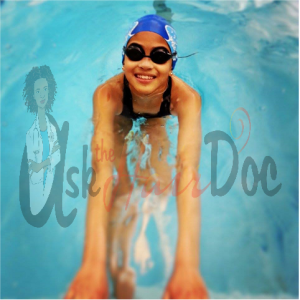
Hi Doc,
I just realized that I need to find an effective shampoo for my daughter as she has been on a local swim team for the last 2 years and currently trains about 4 days a week. Can you provide information on exactly what chlorine does to the hair and the right products and treatment for “swimmers hair” ? She wears her swim cap of course, and it does help a little as her hair is never really soaked.

Photo credit: Facebook Fan Kerry-Ann

Chlorine is no one’s friend. It has been shown mainly in wool (and similarly in hair) to cleave the thioester bonds which bind 18 MEA (a major hair integral lipid) to the cuticle. It also oxidises the disulphide bonds in the proteins of the hair thus degrading them. This results in increased friction between the hair fibres and of course increased fragility of the hair. It can decrease the melanin in the hair causing it to become lighter over time.
As you know the swim caps are not designed to keep the hair from getting wet. There are some that keep the hair drier than others. The best thing to do is to coat the hair with conditioner or oil or a butter such as shea butter and then place the cap on. This also doubles as a deep conditioning treatment and gives little space for the water to eat away at the hair. After swimming wash hair with a good swimmer’s shampoo. These usually have Vit C or sodium thiosulphate to remove residual chlorine. They also contain EDTA to remove copper found in the algaecides present in the pool. Copper deposition is responsible for green tinge in lighter hued hairs. It doesn’t show in black hair but the copper is certainly deposited. Follow with a conditioner. Hope that helps!